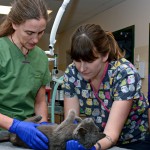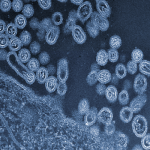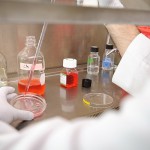Tag Veterinary medicine
New developments in Midwestern canine influenza outbreak
Canine influenza outbreak
$1.3M in grants, gifts fund creation of animal shelter medicine program
Each year, shelters across the country take in anywhere from 4 million to 8 million animals, and each year, 2 million to 5 million of those animals die, according to the most recent estimates from the Humane Society of the United States. Many of these deaths occur despite the efforts of well-meaning animal lovers, often due to lack of information — a problem Newbury is working to address in her role as director of the new SVM Shelter Medicine Program, which was created after the school raised more than $1.3 million in grants, outright gifts and pledges to help fund it into the future.
Halting the hijacker: Cellular targets to thwart influenza virus infection
The influenza virus, like all viruses, is a hijacker. It quietly slips its way inside cells, steals the machinery inside to make more copies of itself, and then - having multiplied - bursts out of the cell to find others to infect.
Influenza researcher Yoshihiro Kawaoka wins Breakthrough Award
The University of Wisconsin–Madison's Yoshihiro Kawaoka has been recognized as a 2014 Popular Mechanics Breakthrough Award recipient for his efforts to understand and prevent pandemic influenza.
Medical procedure for humans helps heal leaky show cow
When a dairy cow leaks milk, it can lead to variety of problems, from hygiene issues to infection. The condition is usually manageable, but for a show cow like Vertigo, it’s unacceptable.
Genes found in nature yield 1918-like virus with pandemic potential
An international team of researchers has shown that circulating avian influenza viruses contain all the genetic ingredients necessary to underpin the emergence of a virus similar to the deadly 1918 influenza virus.
Study puts troubling traits of H7N9 avian flu virus on display
The emerging H7N9 avian influenza virus responsible for at least 37 deaths in China has qualities that could potentially spark a global outbreak of flu, according to a new study published today (July 10, 2013) in the journal Nature.
‘Ninja parasites’ elude immune response through molecular mimicry
In feudal-age Japan, cunning, unorthodox mercenaries known as ninjas were notorious for using disguise, deception, and stealth to infiltrate enemy fortifications. In the world of modern parasites, certain organisms - dubbed "ninja parasites" by Professor Timothy Yoshino - use similar tactics, in a biological and chemical sense, to trick their way past the immune systems of their hosts.
From penguins to hyenas, vet students care for the wildest patients
A UW–Madison initiative is one of only 22 accredited zoological medicine residency programs in the world, and its mission is to prepare veterinarians to effectively treat the increasing number of exotic pets, animals at zoos and aquaria, and injured and sick wildlife — and free-ranging wildlife as well.
Vet med students ensure safe, speedy biosecurity check-in for dairy expo cattle
Scores of trailers will begin rolling into Madison on Friday, Sept. 28, delivering 2,500 show cows to the Alliant Energy Center for the upcoming World Dairy Expo. But to prevent the spread of disease among the cattle, the health status of each animal must be verified before they are unloaded. Fortunately, volunteer students from the UW–Madison School of Veterinary Medicine keep this process running as smoothly as possible.
Study: Cows done in by bad spuds
Anyone taking the recent, mysterious deaths of 200 steers in a Portage County, Wis., feedlot as a sign of the apocalypse can rest easy. The cows, according to the Wisconsin Veterinary Diagnostic Laboratory, were done in by bad spuds.







